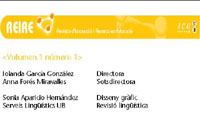The supposed relationship between technology and innovation in education. When does ICT actually improve education?
DOI:
https://doi.org/10.1344/reire2008.1.1112Keywords:
Educational technology, information and communication technology, innovation processes, digital skills, reflection in actionAbstract
At the beginning, Educational Technology as a field of study dealing with the use of such means in education was linked to improving education. This improvement was to come about especially as a result of making educational practice more effective and efficient, and capable of being completely controlled so that it could be predicted and produce the best outcomes. Technology, because it enabled the most to be made –through control- of many natural processes, was seen as a major contribution to improving teaching and learning processes. Now, although research has provided many examples contradicting the claim that the use of technology improves either the process or the outcome of learning in all cases, this relationship is still proclaimed to be necessary, mostly without a precise idea of what it means to innovate in education, as though, moreover, this could be the same for everyone. This article presents, on the one hand, some of the assumptions that necessarily lead us to link educational improvement to technology, and on the other, a view of innovation in education in which technology can play a major part, but only as a result of a reflective exercise by teachers and students on what it means to teach and learn.References
ÁLVAREZ, A., MARTÍNEZ, A. Y MÉNDEZ, R. (1993). Tecnología en acción. Barcelona: RAP.
AREA, M. (2007). Algunos principios para el desarrollo de “buenas prácticas” pedagógicas con las TIC en el aula, Comunicación y Pedagogía, 222, 42-47.
BOSCO, A. (1995). El ordenador en la enseñanza: una práctica innovadora. En: J. M. Sancho y L. M. Millán (Comp.) Op. Cit. Sevilla: Publicaciones M.C.E.P. pp. 279-297.
BOSCO, A. (1996). La tecnología educativa, las prácticas de la enseñanza y el uso del ordenador: ¿una práctica innovadora? Comunicación y Pedagogía, 141, 16-25.
BOSCO, A. (2007). Profesores y estudiantes haciéndose competentes con las TIC: una visión global. En R. Cabello y D. Levis (comp) Medios Informáticos en la Educación (a principios del siglo XXI). Buenos Aires: Prometeo Libros pp-127-147.
CABERO, J. (2000). Nuevas Tecnologías aplicadas a la educación. Madrid: Síntesis.
CASTILLEJO, J. (1986). Tecnología de los procesos educativos. Dimensión cognitiva. En J. Castillejo; A. Colom; J. Escamez; J. Garcia Carrasco; A. Sanvicens; J. Sarramona; G. Vázquez. Tecnología y Educación. Barcelona: Ediciones Ceac S.A. pp. 55-74.
COLOM, A. (1986). Pensamiento Tecnológico y Teoría de la Educación. En J. Castillejo; A. Colom; J. Escamez; J. Garcia Carrasco; A. Sanvicens; J. Sarramona; G. Vázquez. Tecnología y Educación. Barcelona: Ediciones Ceac S.A. pp. 13-30.
GALLEGO ARRUFAT, M.J. (1996). La tecnología educativa en acción. Granada: FORCE Universidad de Granada.
GATES, B. (1997). Camí al futur. Aravaca (Madrid): Mc Graw-Hill
LITWIN, E. (1995). (Comp.) Tecnología educativa. Política, historias, propuestas. Buenos Aires: Paidos cuestiones de educación.
MIMFORD, L. (1969). El mito de la máquina. I: Las técnicas y el desarrollo de la humanidad. Buenos Aires: Emecé.
SKINER, B.F. (1970). Tecnología Educativa. Barcelona: Labor.
SANCHO GIL, J. (1994). Hacia una tecnología crítica. Cuadernos de Pedagogía, 230, 7-12.
SANMARTÍN, J. (1990) Tecnología y futuro humano. Barcelona: Anthropos.
Downloads
Published
How to Cite
Issue
Section
License
Authors keep authorship rights and confer to REIRE the rights of article’s first publication.
All the contents included into REIRE Revista d’innovació i Recerca en Educació are under Creative Commons 4.0 International license attribution, which allows the article’s reproduction, distribution and public communication, whenever authorship and the journal’s title is quoted.







